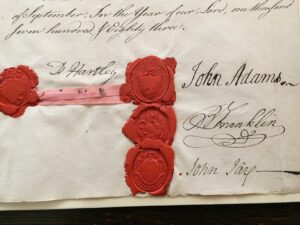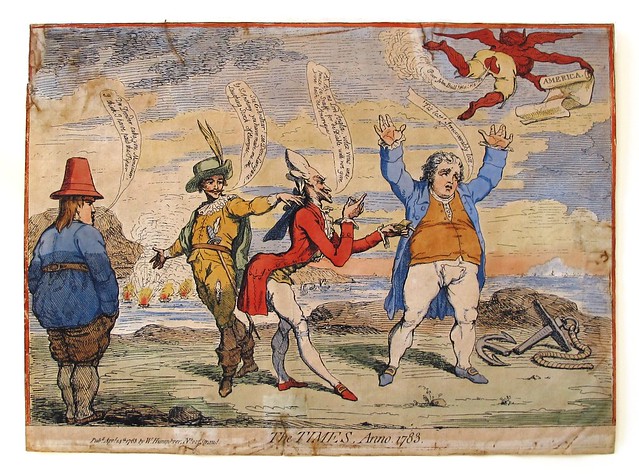
This past weekend marked the 240th anniversary of “one of the two most advantageous treaties ever negotiated for the United States,” the Treaty of Paris. On September 3, 1783, John Jay, John Adams and Benjamin Franklin signed the document that would end the Revolutionary War. The complexities behind the diplomatic maneuvers made to obtain that agreement have recently been revealed in greater detail. At Sotheby’s, an auction of the coded instructions from Congress sent to the principle deliberators reveal that John Jay, a master at codes and espionage, deciphered the directives. Ultimately he and John Adams outvoted Benjamin Franklin and ignored these instructions – their bold actions resulted in a peace and freedom for our country from British control that was lampooned by caricaturist James Gillray.
This print portrays John Bull (representing Great Britain), a broken anchor by his feet, throwing up his arms and crying “Tis lost! Irrecoverably lost” as a red demon flies away with a map labeled “America.” “Poor John Bull! Ha! Ha!” To the left are a stout Dutchman, a rugged Spaniard, and a courtly Frenchman. In the background is the cannonade and smoke of ships firing at each other at Gibraltar. This cartoon is about the Treaty of Paris, signed at the end of the American Revolution, and the battles which were waged concurrently in Europe. With the Treaty of Paris, (negotiated by American Founding Fathers, John Jay, Benjamin Franklin and John Adams) Great Britain recognized America’s independence, here represented by the map carried off by a disrespectful devil. John Bull’s arms are extended as if the map was just snatched out of his hands. He is derided first by a Frenchman, who offers him snuff “Ah. Ah. me Lord Angla. volez vous une pince de snuff for de Diable will not give you back de Amerique.” The Spaniard gestures toward Gibraltar across the water, where a naval battle is ongoing, “See Gibraltar! See Don Langara. By St. Anthony you have made me the Laughing Stock of Europe.” The Dutch, represented by the man off to the corner in blue on the far left, comments “Der Donder take you Monsieur, I think I have paid the Piper.”
Political caricatures like this one by British artist James Gillray in the 18th century inspired American artists like William Charles and Amos Doolittle who later drew upon these lampoons for their own visual commentary on events in the United States. Learn more at an upcoming FREE talk on September 15, 2023 with historian Allison Stagg. Sign up here
Print by James Gillray (1756-1815) The Times, Anno 1783 Pubd. Aprl. 14th. by W. Humphrey No 227 Strand (JHC Archives)
